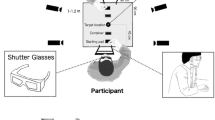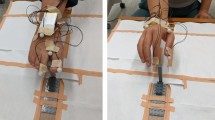Abstract
Post-error slowing (PES), the tendency to slow down a behavioral response after a previous error, has typically been investigated during simple cognitive tasks using response time as a measure of PES magnitude. More recently, PES was investigated during a single reach-to-grasp task to determine where post-error adjustments are employed in a more ecological setting. Kinematic analyses in the previous study detected PES during pre-movement planning and within the grasping component of movement execution. In the current study (N = 22), we increased the cognitive demands of a reach-to-grasp task by adding a choice between target and distractor locations to further explore PES, and other post-error adjustments, under different task conditions. We observed a significant main effect of task condition on overall reaction time (RT); however, it did not significantly impact PES or other post-error adjustments. Nonetheless, the results of this study suggest post-error adjustment is a flexible process that can be observed during pre-movement planning and within the onset and magnitude of the reaching component, as well as in the magnitudes of the grasping component. Considering the sum of the results in the context of existing literature, we conclude that the findings add support to a functional account of error reactivity, such that post-error adjustments are implemented intentionally to improve performance.




Similar content being viewed by others
References
Bahill T, McDonald J (1983) Frequency limitations and optimal step size for the two-point central difference derivative algorithm with applications to human eye movement data. IEEE Trans Biomed Eng 30(3):191–194. https://doi.org/10.1109/TBME.1983.325108
Balogh L, Czobor P (2016) Post-error slowing in patients with ADHD: a meta-analysis. J Atten Disord 20(12):1004–1016. https://doi.org/10.1177/1087054714528043
Blinch J, Trovinger C, DeWinne CR, de Cellio Martins G, Ifediora CN, Nourollahimoghadam M, Harry JR, Palmer TB (in press) Tradeoffs of estimating reaction time with absolute and relative thresholds. Behav Res Methods. https://doi.org/10.3758/s13428-023-02211-4
Botvinick MM, Braver TS, Barch DM, Carter CS, Cohen JD (2001) Conflict monitoring and cognitive control. Psychol Rev 108(3):624. https://doi.org/10.1037/0033-295X.108.3.624
Castellar E, Kuhn S, Fias W, Notebaert W (2010) Outcome expectancy and not accuracy determine post error slowing: ERP support. Cogn Affectective Behav Neurosci 10:270–278. https://doi.org/10.3758/CABN.10.2.270
Ceccarini F, Castiello U (2018) The grasping side of post-error slowing. Cognition 179:1–13. https://doi.org/10.1016/j.cognition.2018.05.026
Compton RJ, Jaskir M, Mu J (2022) Effects of post-response arousal on cognitive control: adaptive or maladaptive? Psychophysiology 59:e13988. https://doi.org/10.1111/psyp.13988
Cousineau D (2017) Varieties of confidence intervals. Adv Cogn Psychol 13(2):140–145. https://doi.org/10.5709/acp-0214-z
Danielmeier C, Ullsperger M (2011) Post-error adjustments. Front Psychol 2:233. https://doi.org/10.3389/fpsyg.2011.00233
Dutilh G, van Ravenzwaaij D, Nieuwenhuis S, van der Maas HL, Forstmann BU, Wagenmakers EJ (2012) How to measure post-error slowing: a confound and a simple solution. J Math Psychol 56(3):208–216. https://doi.org/10.1016/j.jmp.2012.04.001
Eichele H, Juvodden JT, Ullsperger M, Eichele T (2010) Mal-adaptation of event-related EEG responses preceding performance errors. Front Hum Neurosci 4:65. https://doi.org/10.3389/fnhum.2010.00065
Erdfelder E, Faul F, Buchner A (1996) GPOWER: a general power analysis program. Behav Res Methods Instruments Computers 28:1–11. https://doi.org/10.3758/BF03203630
Fievez F, Derosiere G, Verbruggen F, Duque J (2022) Post-error slowing reflects the joint impact of adaptive and maladaptive processes during decision making. Front Hum Neurosci 16:864590. https://doi.org/10.3389/fnhum.2022.864590
Gehring WJ, Fencsik DE (2001) Functions of the medial frontal cortex in the processing of conflict and errors. J Neurosci 21:9430–9437. https://doi.org/10.1523/JNEUROSCI.21-23-09430.2001
Gehring WJ, Goss B, Coles MGH, Meyer DE, Donchin E (1993) A neural system for error-detection and compensation. Psychol Sci 4:385–390. https://doi.org/10.1111/j.1467-9280.1993.tb00586.x
Gentilucci M, Castiello U, Corradini M, Scarpa M, Umilta C, Rizzolatti G (1991) Influence of different types of grasping on the transport component of prehension movements. Neuropsychologia 29(5):361–378. https://doi.org/10.1016/0028-3932(91)90025-4
Haith AM, Pakpoor J, Krakauer JW (2016) Independence of movement preparation and movement initiation. J Neurosci 36:3007–3015. https://doi.org/10.1523/JNEUROSCI.3245-15.2016
Houtman F, Notebaert W (2013) Blinded by an error. Cognition 128(2):228–236. https://doi.org/10.1016/j.cognition.2013.04.003
Jakobson LS, Goodale MA (1991) Factors affecting higher-order movement planning: a kinematic analysis of human prehension. Exp Brain Res 86(1):199–208. https://doi.org/10.1007/BF00231054
Jax SA, Rosenbaum DA (2007) Hand path priming in manual obstacle avoidance: evidence that the dorsal stream does not only control visually guided action in real time. J Exp Psychol Hum Percept Perform 33(2):425–441. https://doi.org/10.1037/0096-1523.33.2.425
Jeannerod M (1981) Intersegmental coordination during reaching at natural visual objects. In: Long J, Baddeley A (eds) Attention and performance IX. Erlbaum, pp 153–168
Jeannerod M (1984) The timing of natural prehension movements. J Mot Behav 16(3):235–254. https://doi.org/10.1080/00222895.1984.10735319
Jentzsch I, Dudschig C (2009) Why do we slow down after an error? Mechanisms underlying the effects of post error slowing. Q J Experimental Psychol 62:209–218. https://doi.org/10.1080/17470210802240655
Kelso JAS, Buchanana JJ, Murata T (1994) Multifunctionality and switching in the coordination dynamics of reaching and grasping. Hum Mov Sci 13(1):63–94. https://doi.org/10.1016/0167-9457(94)90029-9
Lakens D (2013) Calculating and reporting effect sizes to facilitate cumulative science: a practical primer for t-tests and ANOVAs. Front Psychol 4:863. https://doi.org/10.3389/fpsyg.2013.00863
Murphy PR, Moort M, L., Van, Nieuwenhuis S (2016) The pupillary orienting response predicts adaptive behavioral adjustment after errors. PLoS ONE 11(3):1–11. https://doi.org/10.1371/journal.pone.0151763
Notebaert W, Houtman F, Van Opstal F, Gevers W, Fias W, Verguts T (2009) Post-error slowing: an orienting account. Cognition 111(2):275–279. https://doi.org/10.1016/j.cognition.2009.02.002
Orban de Xivry J, Legrain V, Lefevre P (2017) Overlap of movement planning and movement execution reduces reaction time. J Neurophysiol 117(1):117–122. https://doi.org/10.1152/jn.00728.2016
Rabbitt P, M (1966) Error correction time without external error signals. Nature 212:438. https://doi.org/10.1038/212438a0
Regev S, Meiran N (2014) Post-error slowing is influenced by cognitive control demand. Acta Psychol 152:10–18. https://doi.org/10.1016/j.actpsy.2014.07.006
Ridderinkhof KR (2002) Micro- and macro-adjustments of task set: activation and suppression in conflict tasks. Psychol Res 66:312–323. https://doi.org/10.1007/s00426-002-0104-7
Ridderinkhof KR, De Vlugt Y, Bramlage A, Spaan M, Elton M, Snel J, Band GP (2002) Alcohol consumption impairs detection of performance errors in mediofrontal cortex. Science 298(5601):2209–2211. https://doi.org/10.1126/science.1076929
Ruitenberg MFL, Abrahamse EL, Kleine ED, Verwey WB (2014) Post-error slowing in sequential action: an aging study. Front Psychol 5:1–8. https://doi.org/10.3389/fpsyg.2014.00119
Schot WD, Brenner E, Smeets JB (2010) Robust movement segmentation by combining multiple sources of information. J Neurosci Methods 187(2):147–155. https://doi.org/10.1016/j.jneumeth.2010.01.004
Schroder HS, Nickels S, Cardenas E, Breiger M, Perlo S, Pizzagalli DA (2020) Optimizing assessments of post-error slowing: a neurobehavioral investigation of a flanker task. Psychophysiology 57(2):e13473. https://doi.org/10.1111/psyp.13473
Siegert S, Herrojo M, Bru C, Huebl J, Schneider G, Ullsperger M, Ku AA (2014) Error signals in the subthalamic nucleus are related to post-error slowing in patients with Parkinson’s disease. Cortex 60:103–120. https://doi.org/10.1016/j.cortex.2013.12.008
Sobinov AR, Bensmaia SJ (2021) The neural mechanisms of manual dexterity. Nat Rev Neurosci 22(12):741–757. https://doi.org/10.1038/s41583-021-00528-7
Song J, Nakayama K (2008a) Numeric comparison in visually guided manual reaching task. Cognition 106(2):994–1003. https://doi.org/10.1016/j.cognition.2007.03.014
Song J, Nakayama K (2008b) Target selection in visual search as revealed by movement trajectories. Vision Res 48(7):853–861. https://doi.org/10.1016/j.visres.2007.12.015
Topor M, Opitz B, Leonard HC (2021) Error-related cognitive control and behavioral adaptation mechanisms in the context of motor functioning and anxiety. Front Hum Neurosci 15:615616. https://doi.org/10.3389/fnhum.2021.615616
Whishaw IQ, Karl JM (2014) The contribution of the reach and the grasp to shaping brain and behaviour. Can J Exp Psychol 68(4):223–235. https://doi.org/10.1037/cep0000042
Wong AL, Haith AM, Krakauer JW (2015) Motor planning. Neuroscientists 21(4):385–398. https://doi.org/10.1177/1073858414541484
Funding
No funding was received for conducting this study.
Author information
Authors and Affiliations
Corresponding author
Ethics declarations
Conflicts of interest
We have no conflicts of interest to disclose.
Additional information
Communicated by Bill J Yates.
Publisher’s Note
Springer Nature remains neutral with regard to jurisdictional claims in published maps and institutional affiliations.
Electronic supplementary material
Below is the link to the electronic supplementary material.
Rights and permissions
Springer Nature or its licensor (e.g. a society or other partner) holds exclusive rights to this article under a publishing agreement with the author(s) or other rightsholder(s); author self-archiving of the accepted manuscript version of this article is solely governed by the terms of such publishing agreement and applicable law.
About this article
Cite this article
Opdenaker, J., Blinch, J. & Scolari, M. Post-error adjustments occur in both reaching and grasping. Exp Brain Res 242, 1495–1505 (2024). https://doi.org/10.1007/s00221-024-06836-5
Received:
Accepted:
Published:
Issue Date:
DOI: https://doi.org/10.1007/s00221-024-06836-5




